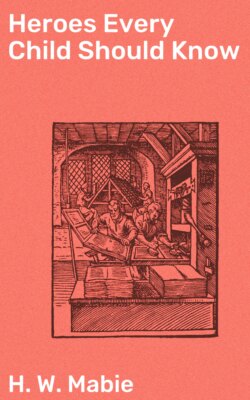Читать книгу Heroes Every Child Should Know - H. W. Mabie - Страница 13
На сайте Литреса книга снята с продажи.
The Seventh Labour: Capturing the Cretan Bull
ОглавлениеTable of Contents
Just as Zeus who, as we said in the beginning, was King of all heaven that is the air and clouds, so Posidon was King of the sea. With his queen, Amphitrite, he lived far down underneath the waves, and dwelt in a palace splendid with all the beautiful things of the deep.
In the midst of the blue waters of the Mediterranean where Posidon had his home, lies an island called Crete, and long ago in the days when Hercules laboured, a King, whose name was Minos, ruled over this land. The island is long and narrow and has much sea coast, and because of this fact King Minos stood in intimate relations with the god of the sea.
Now one day in an especial burst of friendliness, Minos vowed to sacrifice to Posidon whatever should come out of the salt waters. The god in pleasure at the vow, and to test mayhap the devotion of Minos, sent at once a beautiful bull leaping and swimming through the waves. When the creature had come to the rocky coast and made land, its side shone with such beauty, and its ivory-white horns garlanded with lilies set so like a crown above its graceful head that Minos and all the people who saw it marvelled that anywhere could have grown such a bull. And a sort of greed and deceit seized Minos as he gazed, and for his sacrifice to Posidon he resolved to use another bull. And so he ordered his herdsman to take this fair creature that had come from the sea and to put it among his herd, and also to bring forth another for the offering.
Because of this avarice of Minos the god below the waves was angry and he made the bull wild and furious, so that no herdsman dared approach to feed or care for it. For his seventh task Eurystheus commanded Hercules to fetch him this mad bull of Crete.
Hercules accordingly boarded one of the ships that plied in that far-off day, as well as in this time of ours, between the rocky coast of Crete and the fair land of Hellas, and in due time the hero came to Minos' court. "I have come, sire," said Hercules, "for the mad bull that terrifies thy herdsmen and is rumoured beyond capture." "Ay, young man," cried the king, "thou hast come for my bull and my bull shalt thou have. When thou hast taken it, it is thine," and the King laughed grimly, for the strength and fury of the creature he deemed beyond any man's control.
Hercules sought the grove where Posidon's gift had strayed from its fellows, and there deftly seizing it by the horns, he bound its feet with stout straps of bull's hide and its horns he padded with moss of the sea from which it came, and so having made it powerless he lifted it to his shoulders and carried it to the shore. A swift black ship was just spreading sail from Crete, and entering upon it the hero soon ended his journey and laid his capture before Eurystheus.
A day or two later Hercules loosed the bull, which, after wandering through the woodlands of Arcadia, crossed the isthmus and came to the plains of Marathon, whence, after doing much damage, it swam off to sea and was never heard of after.
So far we have told how Hercules accomplished seven of the tasks laid upon him. Space does not permit us to recount in detail the other five. The eighth task was to bring to Eurystheus the man-eating mares of the King of Windy Thrace. The ninth task was to fetch a girdle which Ares, god of war, had given the Queen of the Amazons—an exceedingly difficult labour, for the Amazons were a nation of women-warriors renowned for valour. For the tenth task Eurystheus demanded the purple oxen of a famous giant who dwelt on an island far out in the ocean. The eleventh task was to bring apples from the garden of the Hesperides—golden apples guarded by a dragon with a hundred heads, no one of which ever closed its eyes in sleep. And the twelfth and last task, which was to free the mighty Hercules from his bondage to cowardly Eurystheus, was to fetch Cerberus, the three-headed dog, who guarded the entrance to Hades, the unseen abode of departed spirits.
Each and every one of these labours the strong hero accomplished. Having won his freedom and gained the honours promised by the priestess at Delphi many years before, Hercules worked many a noble deed and finally in reward for his much enduring and his aid to mortals, he was carried upon a thunder cloud to the upper air, and entered into the very gates of heaven.
